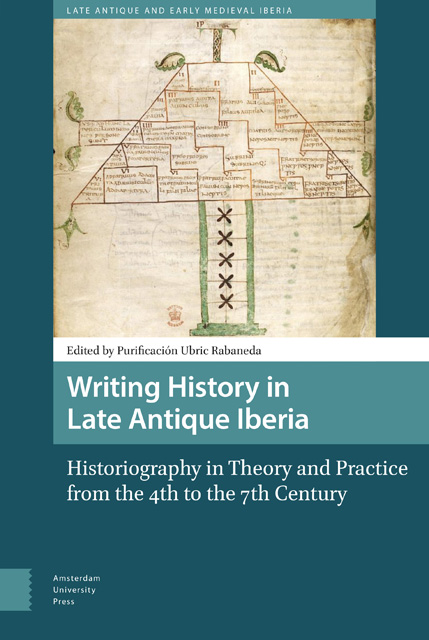 Writing History in Late Antique Iberia
Writing History in Late Antique Iberia Published online by Cambridge University Press: 18 April 2023
Abstract
Even to this day, the history of ancient Rome, despite the size of her empire, is all too often exclusively considered through the eyes and reactions of metropolitan Romans. This chapter primarily uses the example of the Spanish writer Paulus Orosius to explore the response of provincials to their membership of the Roman Empire. It examines how Orosius, within his overall general history of antiquity, carefully uses incidents from the Iberian peninsula, such as the siege of Numantia and the Cantabrian Wars, at crucial moments in its development to underline the importance as he sees it of local contributions to the empire. The chapter develops these points to examine the growth of a Burkean Romanitas where local and broader forms of identity formed complimentary rather than competing roles.
Keywords: Orosius, Burkean Romanitas, provincials, identity
In 2015, a Roman tombstone was unearthed in Cirencester in South West England. It bore a dedication to a 27-year-old woman named Bodicaca: a variant of the name Boudica. Though no firm dating is possible, the stone is likely to have been carved in the second century AD, some two generations after the uprising against Rome in South East England led by the Queen of the Iceni. Memories of the Queen lived on in Britain throughout the Roman period and beyond. The fifth-century author Gildas speaks of a ‘treacherous lioness’, leana dolosa , who butchered the rulers in Britain who had been appointed by Rome, and it is difficult not to see a gesture to the Icenian queen here. This reference is deeply hostile and there can be no doubt that it reflects Gildas’s own feelings. But these may not have been typical of his times. Gildas wrote to induce repentance in his audience and to do this he belittles the Britons at every opportunity, presenting them as a deeply flawed and ungrateful race who deserved to suffer. It is likely, therefore, that here he is deploying the rhetorical trope of refutatio : denigrating in advance an episode of history well known to his contemporary readers, which they would have used to counter his arguments. In short, the passage suggests that there was both a positive and a negative memory of Boudica in late-Roman and immediate post-Roman Britain.
To save this book to your Kindle, first ensure no-reply@cambridge.org is added to your Approved Personal Document E-mail List under your Personal Document Settings on the Manage Your Content and Devices page of your Amazon account. Then enter the ‘name’ part of your Kindle email address below. Find out more about saving to your Kindle.
Note you can select to save to either the @free.kindle.com or @kindle.com variations. ‘@free.kindle.com’ emails are free but can only be saved to your device when it is connected to wi-fi. ‘@kindle.com’ emails can be delivered even when you are not connected to wi-fi, but note that service fees apply.
Find out more about the Kindle Personal Document Service.
To save content items to your account, please confirm that you agree to abide by our usage policies. If this is the first time you use this feature, you will be asked to authorise Cambridge Core to connect with your account. Find out more about saving content to Dropbox.
To save content items to your account, please confirm that you agree to abide by our usage policies. If this is the first time you use this feature, you will be asked to authorise Cambridge Core to connect with your account. Find out more about saving content to Google Drive.